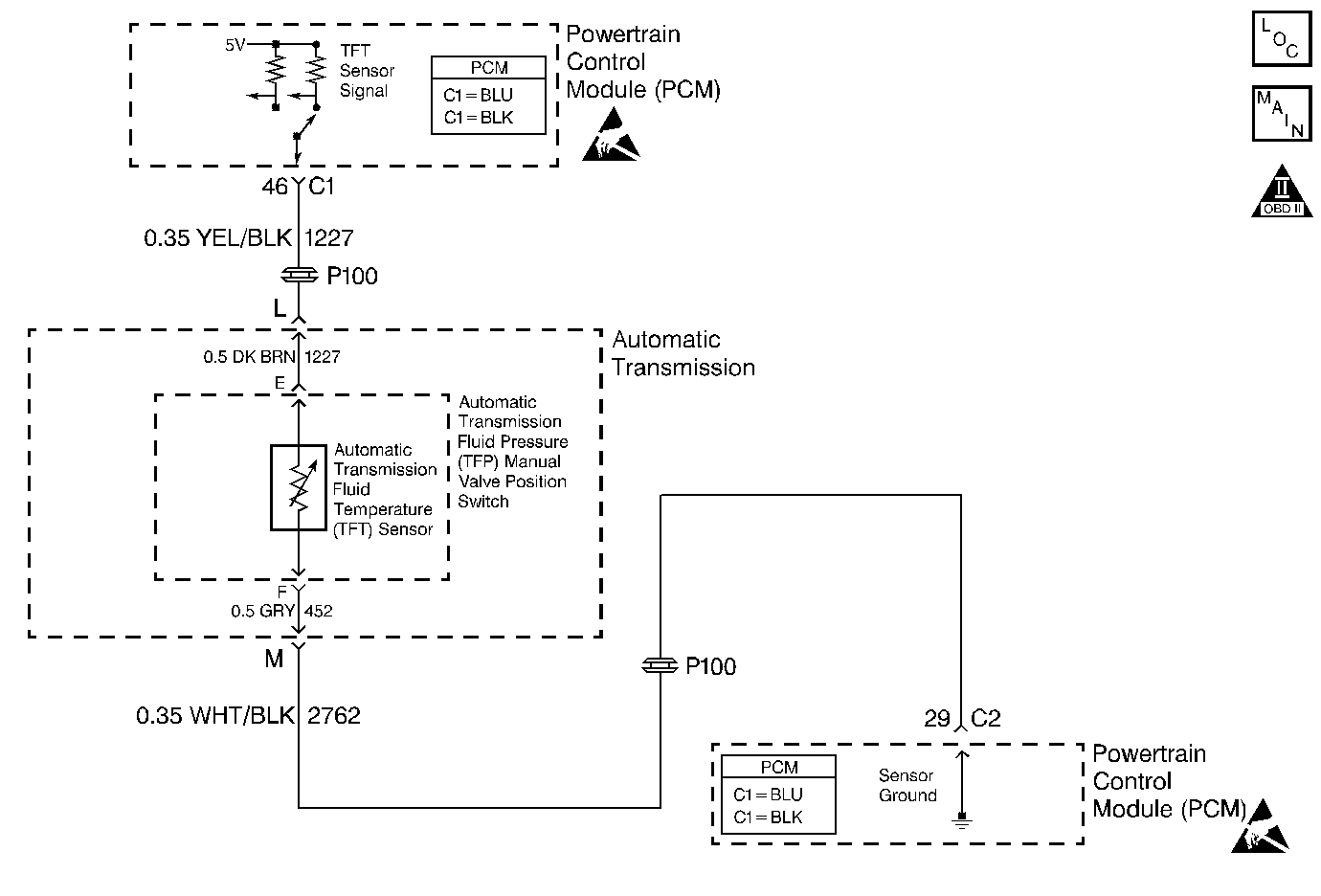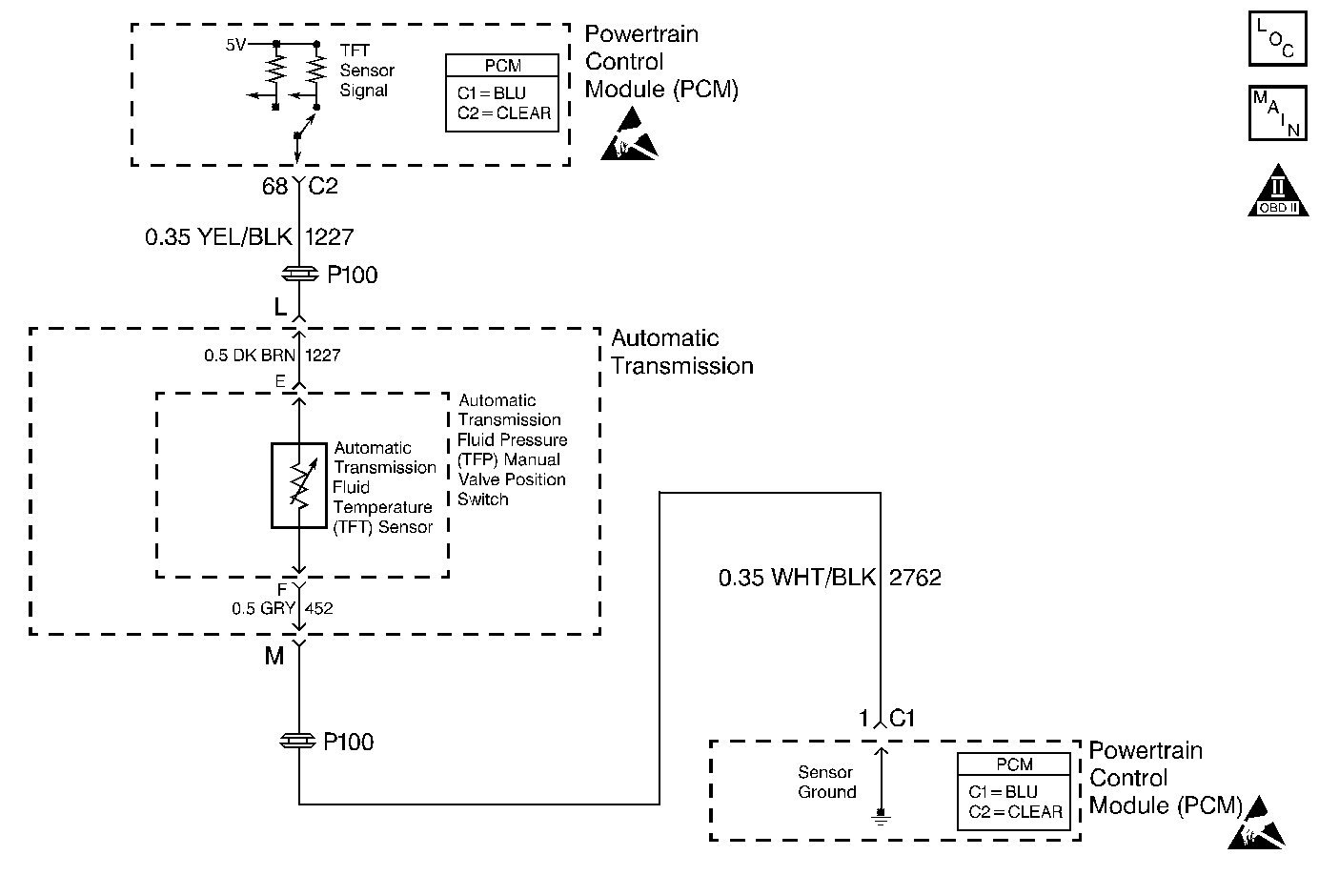DTC P0712 Transmission Fluid Temperature (TFT) Sensor Circuit Low Input 2.4L

Circuit Description
The automatic transmission fluid temperature (TFT) sensor is a thermistor. The TFT sensor is part of the automatic transmission fluid pressure (TFP) manual valve position switch. The PCM supplies a 5 volt reference signal to the sensor on circuit 1227. When the transmission fluid is cold, the sensor resistance is high and the PCM senses a high signal voltage. As the transmission fluid warms, the sensor resistance lowers and the PCM senses lower voltage. The PCM uses the TFT reading in order to control the torque converter clutch (TCC), line pressure adjustments, and temperature compensated shifts.
When the PCM detects a continuous short to ground in the TFT circuit or the TFT sensor, then DTC P0712 sets. DTC P0712 is a type D DTC.
Conditions for Running the DTC
| • | The ignition switch is in the RUN position. |
| • | The system voltage is 8-18 volts. |
Conditions for Setting the DTC
The TFT voltage is less than 0.33 volts for 10 seconds.
Action Taken When the DTC Sets
| • | The PCM does not illuminate the malfunction indicator lamp (MIL). |
| • | The PCM freezes shift adapts from being updated. |
| • | The PCM calculates a default transmission fluid temperature based on engine coolant temperature, intake manifold air temperature, and engine run time. |
| • | The PCM stores DTC P0712 in PCM history. |
Conditions for Clearing the DTC
| • | A scan tool clears the DTC from PCM history. |
| • | The PCM clears the DTC from PCM history if the vehicle completes 40 consecutive warm-up cycles without a non-emission-related diagnostic fault occurring. |
| • | The PCM cancels the DTC default actions when the fault no longer exists and the ignition switch is OFF long enough in order to power down the PCM. |
Diagnostic Aids
| • | Inspect the wiring at the PCM, the transmission 20-way connector, the TFP manual valve position switch 6-way connector, and all other circuit connecting points for the following conditions: |
| - | A backed out terminal |
| - | A damaged terminal |
| - | Reduced terminal tension |
| - | A chafed wire |
| - | A broken wire inside the insulation |
| - | Moisture intrusion |
| - | Corrosion |
| • | When diagnosing for an intermittent short or open condition, massage the wiring harness while watching the test equipment for a change. |
| • | Test the TFT sensor at various temperatures in order to evaluate the possibility of a skewed (mis-scaled) sensor. Refer to the Temperature vs Resistance table. A skewed sensor may cause delayed garage shifts or TCC complaints. |
Test Description
The numbers below refer to the step numbers on the diagnostic table.
-
This step tests the PCM's ability to detect an open circuit.
-
This step tests the TFT sensor for correct resistance.
Step | Action | Value(s) | Yes | No | ||||
|---|---|---|---|---|---|---|---|---|
1 | Was the Powertrain On-Board Diagnostic (OBD) System Check performed? | -- | ||||||
2 |
Important: Before clearing the DTCs, use the scan tool in order to record the Failure Records. Using the Clear Info function erases the Failure Records from the PCM. Does the scan tool display a TFT sensor voltage less than specified? | 0.33 V | Go to Diagnostic Aids | |||||
Does the scan tool display a TFT sensor voltage greater than specified? | 4.92 V | |||||||
4 | Inspect circuit 1227 from the engine 20-way connector to the PCM connector for a short to ground. Refer to General Electrical Diagnosis in Wiring Systems. Was the condition found? | -- | ||||||
Is the resistance within the range specified for the given transmission temperatures? | 20°C (68°F) 3,106-3,923 ohms 100°C (212°F) 164-190 ohms | |||||||
6 | Measure the resistance between terminal L and a good ground on the transmission case. Is the resistance less than the specified value? | 1,000 ohms | Go to Diagnostic Aids | |||||
7 |
Is the resistance less than the specified value? | 1,000 ohms | ||||||
8 | Repair the wiring as necessary. Refer to Wiring Repairs in Wiring Systems. Is the repair complete? | -- | -- | |||||
9 | Replace the TFP manual valve position switch. Refer to Pressure Switch Assembly Replacement. Is the replacement complete? | -- | -- | |||||
10 | Replace the automatic transmission wiring harness Refer to Unit Repair. Is the replacement complete? | -- | -- | |||||
11 | Replace the PCM. Refer to Powertrain Control Module Replacement/Programming in Engine Controls. Is the replacement complete? | -- | -- | |||||
12 | Perform the following procedure in order to verify the repair:
Has the test run and passed? | -- | System OK |
DTC P0712 Transmission Fluid Temperature (TFT) Sensor Circuit Low Input 3.1L

Circuit Description
The automatic transmission fluid temperature (TFT) sensor is a thermistor. The TFT sensor is part of the automatic transmission fluid pressure (TFP) manual valve position switch. The PCM supplies a 5 volt reference signal to the sensor on circuit 1227. When the transmission fluid is cold, the sensor resistance is high and the PCM senses a high signal voltage. As the transmission fluid warms, the sensor resistance lowers and the PCM senses lower voltage. The PCM uses the TFT reading in order to control the torque converter clutch (TCC), line pressure adjustments, and temperature compensated shifts.
When the PCM detects a continuous short to ground in the TFT circuit or the TFT sensor, then DTC P0712 sets. DTC P0712 is a type D DTC.
Conditions for Running the DTC
| • | The ignition switch is in the RUN position. |
| • | The system voltage is 8-18 volts. |
Conditions for Setting the DTC
The TFT voltage is less than 0.33 volts for 10 seconds.
Action Taken When the DTC Sets
| • | The PCM does not illuminate the malfunction indicator lamp (MIL). |
| • | The PCM freezes shift adapts from being updated. |
| • | The PCM calculates a default transmission fluid temperature based on engine coolant temperature, intake manifold air temperature and engine run time. |
| • | The PCM stores DTC P0712 in PCM history. |
Conditions for Clearing the DTC
| • | A scan tool clears the DTC from PCM history. |
| • | The PCM clears the DTC from PCM history if the vehicle completes 40 consecutive warm-up cycles without a non-emission-related diagnostic fault occurring. |
| • | The PCM cancels the DTC default actions when the fault no longer exists and the ignition switch is OFF long enough in order to power down the PCM. |
Diagnostic Aids
| • | Inspect the wiring at the PCM, the transmission 20-way connector and the TFP manual valve position switch 6-way connector for the following conditions: |
| - | A backed out terminal |
| - | A damaged terminal |
| - | Reduced terminal tension |
| - | A chafed wire |
| - | A broken wire inside the insulation |
| - | Moisture intrusion |
| - | Corrosion |
| • | When diagnosing for an intermittent short or open condition, massage the wiring harness while watching the test equipment for a change. |
| • | Test the TFT sensor at various temperatures in order to evaluate the possibility of a skewed (mis-scaled) sensor. Refer to the Temperature vs Resistance table. A skewed sensor may cause delayed garage shifts or TCC complaints. |
Test Description
The numbers below refer to the step numbers on the diagnostic table.
-
This step tests the PCM's ability to detect an open circuit.
-
This step tests the TFT sensor for correct resistance.
Step | Action | Value(s) | Yes | No | ||||
|---|---|---|---|---|---|---|---|---|
1 | Was the Powertrain On-Board Diagnostic (OBD) System Check performed? | -- | ||||||
2 |
Important: Before clearing the DTCs, use the scan tool in order to record the Failure Records. Using the Clear Info function erases the Failure Records from the PCM. Does the scan tool display a TFT sensor voltage less than specified? | 0.33 V | Go to Diagnostic Aids | |||||
Does the scan tool display a TFT sensor voltage greater than specified? | 4.92 V | |||||||
4 | Inspect circuit 1227 from the engine 20-way connector to the PCM connector for a short to ground. Refer to General Electrical Diagnosis in Wiring Systems. Was the condition found? | -- | ||||||
Is the resistance within the range specified for the given transmission temperatures? | 20°C (68°F) 3,106-3,923 ohms 100°C (212°F) 164-190 ohms | |||||||
6 | Measure the resistance between terminal L and a good ground on the transmission case. Is the resistance less than the specified value? | 1,000 ohms | Go to Diagnostic Aids | |||||
7 |
Is the resistance less than the specified value? | 1,000 ohms | ||||||
8 | Repair the wiring as necessary. Refer to Wiring Repairs in Wiring Systems. Is the repair complete? | -- | -- | |||||
9 | Replace the TFP manual valve position switch. Refer to Pressure Switch Assembly Replacement. Is the replacement complete? | -- | -- | |||||
10 | Replace the automatic transmission wiring harness Refer to Unit Repair. Is the replacement complete? | -- | -- | |||||
11 | Replace the PCM. Refer to Powertrain Control Module Replacement/Programming in Engine Controls. Is the replacement complete? | -- | -- | |||||
12 | Perform the following procedure in order to verify the repair:
Has the test run and passed? | -- | System OK |
